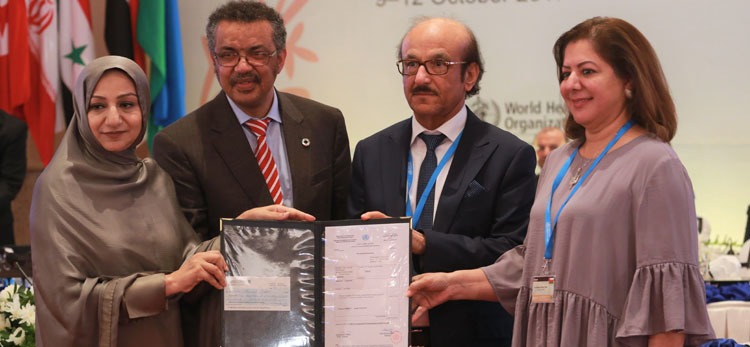
11 October 2017, Islamabad, Pakistan -- On the first day of the regular session of the 64th Regional Committee of the Eastern Mediterranean, the Regional Director’s annual report for 2016, health emergencies and polio eradication were at the core of the discussions.
Dr Mahmoud Fikri, WHO Regional Director presented the annual report on the work of the Regional Office in 2016. He focused on important milestones achieved in response to the five strategic priorities and outlined WHO support to health systems strengthening to achieve universal health coverage. He also drew attention to the new WHO health emergencies programme, which was expected to bolster WHO’s ability to respond to emergencies and outbreaks. He then focused on the regional roadmap that translated his vision into a set of strategic actions to guide WHO’s work with Member States for 2017‒2021. “Our aim is to ensure that WHO continues to deliver and provide support to countries as one strong WHO and I look forward to working with you all to realize this vision", Dr Fikri said.
Through his five-year roadmap, Dr Fikri said he aims to increase WHO’s capacity to meet the needs of Member States. The roadmap was developed around four interrelated pillars that translate the vision into action to guide WHO’s work: (1) public health priorities, (2) enabling factors, (3) WHO’s presence in countries, and (4) WHO’s working environment.
Noncommunicable diseases (NCDs) were given special attention during the day’s discussions. Dr Tedros announced the establishment of a new High-level global Commission on Noncommunicable Diseases (NCDs), to be chaired by Dr Sania Nishtar from Pakistan. Dr Nishtar is a prominent global advocate for action against NCDs, and former Federal Minister in the 2013 caretaker government of Pakistan with responsibility for health, science and technology, information technology and higher education.
An update on polio eradication in Pakistan and Afghanistan in the Region highlighted the success of polio supplementary immunization activities in 2017 in restricting transmission. Ensuring an end to polio transmission in Pakistan and Afghanistan in the coming low season and transmission in Syrian Arab Republic remained a challenge.
With the Region experiencing an unprecedented increase in the magnitude and scale of crises, humanitarian emergencies were also prominent on the first day’s agenda; the Region more than 50% of global Grade 3 emergencies were in the Region with other countries experiencing a mix of chronic and acute emergencies. Refugees in the Region now totalled 15.7 million and 18 million people were internally displaced. Population movement was overwhelming health systems of host communities and neighbouring countries, and in some cases, reversing health gains. The high incidence of emerging and re-emerging infectious diseases was impacting global and regional health security. In response, the WHO Health Emergency Programme had mobilized US$ 293 million and delivered 920 tons of health supplies but the funding gap remained at US$ 200 million.
The Dr A.T. Shousha Foundation Prize for 2017 was awarded to Dr Yasmin Ahmed Jaffer of Oman, for her significant contribution to public health in Oman, particularly in the area of women’s and children’s health. Dr Ahmed Jaffer is currently Senior Consultant and Advisor in the Directorate-General for Primary Health Care, Oman.
Key topics to be discussed during the coming days by the Regional Committee include on cancer prevention and control; women, children and adolescent health; antimicrobial resistance; and climate change and health.


